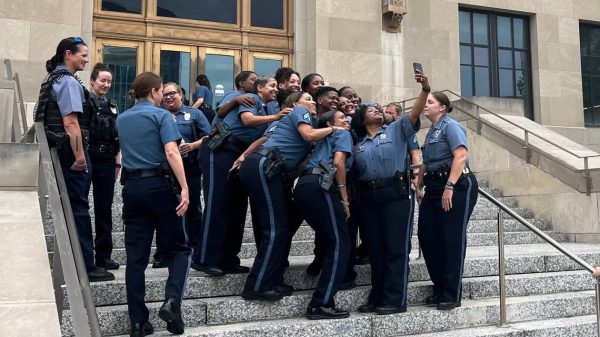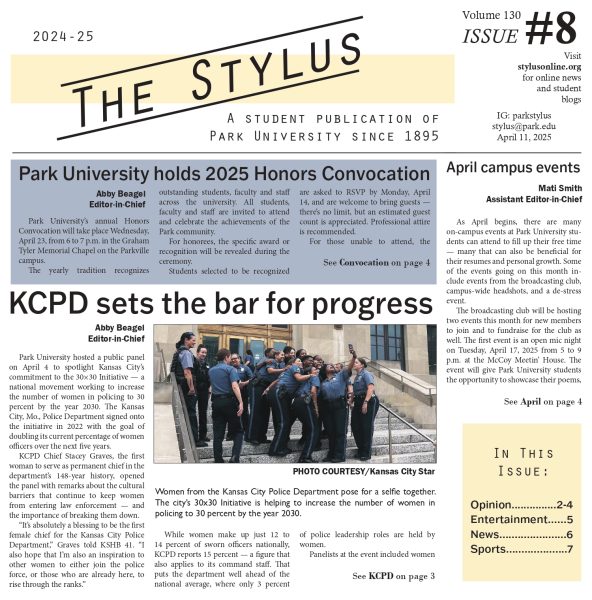Anxiety causes stress and setbacks among college students
“It really sucks when you have to go to a teacher you really respect and really look up to and… you got to ask them [for an extension] and tell them that you let them down,” said Connor Jones, a senior multimedia journalism and public relations major.
According to a 2018 survey done by the American College Health Association, over 60 percent of students surveyed had felt “overwhelming anxiety” within the past 12 months. Twenty-seven percent of respondents reported having felt overwhelming anxiety within the past two weeks.
Jones is nearing the end of his college career and recounted how for the first two and a half years of college, he never had to ask for an extension on a paper. As time went on, he said he procrastinated more, which would cause him more anxiety.
“I’m really bad at pushing it down and ignoring it,” he said. “Subconsciously I’ll know that if I go to try to accomplish some task that I know usually gives me anxiety, sometimes it’s as small as emailing a teacher, I won’t do it or I’ll put it off for way longer than it should be.”
Procrastination is a bad habit that affects anxiety and stress levels. According to a meta-analysis by Piers Steel, Ph.D., a psychologist at the University of Calgary, 80 to 95 percent of college students procrastinate.
“With homework it really plays into my procrastination,” said Carin Bublitz, a senior multimedia journalism and public relations major “It plays into my anxiety. I don’t want to think about it and then boom! It’s 10 o’clock on a Sunday, and I have a midnight assignment due and I need to get this done now. It may not be my best work, but I do get it done.”
Bublitz said she has felt anxiety about contacting professors. If she missed a day, she would worry about bothering the professor with an email saying she was sick and also worried about them not believing her.
According to the same ACHA survey, 22 percent of respondents had been diagnosed or treated for anxiety and 11 percent had sought help for panic attacks.
Bublitz said she also deals with social anxiety and panic attacks.
“Having a panic attack is really scary because it’s hard to come out of it by yourself,” she said. “I try to fight it by myself. It’s really hard to bring yourself out of your own head and out of your panic attacks.”
According to the Anxiety and Depression Association of America, panic attacks occur unexpectedly and are accompanied with various physical reactions, including accelerated heart rate, shortness of breath, dizziness, depersonalization and fear of dying.
Luckily, most people who deal with anxiety in college won’t experience panic attacks. Panic disorders are exceedingly rare, with most estimates suggesting just five percent of people will deal with the disorder in their lives. However, it is possible to have a panic attack without suffering from a panic disorder.
Anxiety and panic attacks can be managed through being proactive. That can mean not procrastinating, learning coping mechanisms or speaking with professors about what steps to take to stay on track in their courses.
“Usually when I have someone in my office that is really stressed out about getting things done, I talk about the first thing to do is to take a deep breath and know this is not the end of the world. No matter what happens, life will go on,” said Lora Cohn, Ph.D., associate professor of communication.
Cohn said she’s noticed more and more students are stressing out over grades and earning As. She and Chris Thomas, a Park University adjunct professor who teaches public speaking, said they’ve seen education become increasingly outcome-based. They said students are so stressed about maintaining high GPAs that they lose sight of actually learning and processing the material.
“I suggest that people start with something that they feel like they can do and do well,” said Cohn. “So, they’re studying for finals; pick a class where you have a pretty good [grade] and make a study guide for that class.”
She suggests starting with something easy because it can help students work their way into studying and build their confidence.
Cohn had advice for faculty when students come to them because they’re stressed out or anxious.
“Ask a lot of questions because sometimes just asking questions can help students figure out their problems,” she said. “Share stories about your own stress and pay attention to students in class.”
She said when students start skipping class and turning in work that is not up to their usual standard, to ask questions and email them.
“I think professors need to think about their persona in the classroom,” she said. “Are they the hard [sic], are they making students uncomfortable and not talking to them because that’s their classroom persona? Do they want that? When a student throws themselves off the Bond Bridge because they were failing statistics… how’re you going to feel when that student disappears?”
Professors are a great resource, but for some people who deal with anxiety it can be difficult to start that discussion.
Brant Winn, Ph.D., director of field experience and assistant professor of education, said he works to create a safe environment in his classroom and to build relationships with his students. This makes it easier for his students to let him know when they’re struggling and need help.
“I try to create this culture in my classroom, that they’re really honest with me, and say, ‘hey I’m kind of feeling anxiety-filled, or I’m feeling stressed,’” he said.
Winn teaches educational psychology and focuses on trauma education. He works with his students to understand their own trauma and anxiety so they’re better equipped to help their own students when they become educators.
To help students not get overwhelmed in classes, Winn said that providing students choices in their assignments, the opportunity for revision and the ability to get feedback before the final deadline often lowers student’s stress levels.
Winn said that when college students struggle with anxiety, they start withdrawing and not coming to class, which can be the first warning sign that something is wrong.
“I would advise professors to see the obvious warning signs [of anxiety],” said Corina Rodriguez, a senior psychology major. “If somebody is not doing well on their assignments and they’re not coming to you with questions… or avoiding eye contact, I would advise professors to reach out to them via email. It’s a lot easier to communicate with somebody over media now… rather than face-to-face, which is where a lot of social anxiety comes from.”
Rodriguez explained one of the key factors of anxiety is irrational thought. Counteracting irrational thoughts with more logical, rational thoughts can be a coping mechanism for anxiety.
There are many kinds of coping mechanisms. One mechanism Rodriguez suggested is meditation and breathing exercises. She said meditation and focused breathing work to slow down a person’s heart rate, which is a typical symptom of anxiety.
The increased heart rate can pair with adrenaline and cause a fight, flight or freeze reaction. Along with slowing down the heart rate, mindful breathing can also help slow down irrational thoughts.
“I made the best purchase of 2019,” said Bublitz. “I bought this little squishy narwhal, and I squeeze that, and it’s very therapeutic for me.”
Bublitz also said to help with her anxiety she’s made her office at home a very calming space. There are only pastel colors and things that bring her joy in that room. Some examples were pictures her friends had painted her while she was going through a hard time with her family, as well as decorations with cacti on them. Bublitz also frequently uses aroma therapy. She said the scent that helps her relax the most is lavender.
Sometimes small day-to-day coping mechanisms aren’t enough. Sometimes stress and anxiety reach a crisis point in which even the best candle or stress ball can’t fix.
Winn said that if a professor enters a situation where a student comes to them in crisis, he would advise they first let the student know that they are not alone. He said that often when students reach that level of crisis they feel alone.
Next, he said professors should inform the student what resources they have available to them, such as the counseling center, and walk with them to get the expert help that they need in that moment.
Despite the wide array of techniques to help people handle their anxiety, the science is still out on why it happens or how it works at a neurobiological level.
“The etiology of anxiety is one of the big questions in brain science currently,” Dustin Wall, director of the Park University counseling center, wrote in an email. “But it’s believed that both genetic and environmental factors contribute to symptom display.”
The counseling center is free for Park University students, and they offer counseling with licensed professionals. They are located in Dearing Hall, the brick building next to Chestnut Residence Hall. To make an appointment, email [email protected].
Your donation will support the student journalists of Park University. Your contribution will allow us to cover our annual website hosting costs, freeing up other funds for equipment, printing and training.








